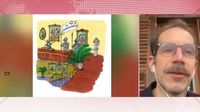In a surprising turn of events, the French Ministry of Education has canceled a planned printing of 900,000 copies of Jul's modern illustrated version of "La Belle et la Bête" just a day before the launch, raising significant concerns about censorship in education. The decision, announced on March 20, 2025, came after a letter dated March 17, 2025, indicated that the ministry found the themes in Jul's illustrations unsuitable for young readers, specifically the CM2 level students, who are typically around 10-11 years old.
Jul, a well-known cartoonist recognized for his work in "Silex and the City," expressed disbelief over the sudden cancellation, stating in an interview, "C'est très mystérieux. On n'a pas compris avec l'éditeur, qui est partenaire du ministère. On avait travaillé, pendant des mois." His statement highlights the shock and confusion felt by those involved in the project, especially considering the illustrations had already been approved for publication.
The situation unfolded as part of the "Un livre pour les vacances" initiative, a program that supplies French CM2 students with classic literature designed to foster a love of reading before entering middle school. Since its inception in 2018, this program has distributed various important works, and this year, the choice had fallen on Jeanne-Marie Leprince de Beaumont's "La Belle et la Bête." It was a significant opportunity for Jul, who aimed to bring a fresh, amusing interpretation to the beloved tale, blending the timeless narrative with modern cultural references.
However, according to the ministry officials, the illustrations went too far. Caroline Pascal, the Director General of Educational Services, outlined in her letter that the book dealt with themes considered too mature for the target age group, including alcohol use and social networks. She stated, "Les illustrations de l'ouvrage abordent des thématiques qui conviendraient à des élèves plus âgés, en fin de collège ou début de lycée," thus emphasizing the ministry's stance that some content necessitated pedagogical support.
Minister Élisabeth Borne weighed in on the matter, expressing her belief that while Jul is talented, the work isn't suitable "sans accompagnement pédagogique," meaning without the guidance of a teacher. Speaking on CNews, Borne further elaborated that families should be able to read an educational book together during holidays, and she questioned the appropriateness of the material as it was.
Despite this, Jul contended that the content was playful and accessible, intended to engage children in a light-hearted manner. He remarked, "Quand on a appris cette censure intempestive, au dernier moment [...] on est tombé de notre chaise," underscoring the abruptness of the decision and his concerns about the communications from the ministry.
The irony of the situation is heightened by the initial enthusiasm shown for the book; Borne had even written a glowing preface beforehand, celebrating the delightful modernization of the 18th-century text. Jul recalls this and questions what has led to such a drastic policy shift, stating, "Les prétextes fallacieux et pour partie mensongers invoqués pour justifier la censure ne tiennent pas la route une seconde devant l’examen du livre en question." His insistence that there are deeper motivations behind the cancellation complicates the narrative, introducing a political element to the discussion.
Furthermore, the incident has raised broader questions about the current climate of censorship in educational contexts, paralleling recent actions taken in other countries. The language used by the French ministry echoes recent discussions in educational debates elsewhere, particularly a controversial stance taken regarding children's literature in the United States, as noted by Jul. He stated, "C'est incompréhensible," expressing disbelief not only about the cancellation itself but also about the implications it carries for future educational literature curated for young minds.
With 900,000 copies canceled at the last minute, the program faces a significant setback. The logistics suggest that students may miss out on receiving any book within the scheduled timeline. The decision has struck a nerve, with Jul labeling it possibly "la plus grosse affaire de censure jamais survenue dans l’édition en France," marking it as a historic moment that might alter the landscape regarding publishing and educational content.
This whole event serves as a reminder of the sensitive balance between education, freedom of expression, and the cultural contexts in which such material is created and distributed. Jul's concerns reflect a growing unease with how much control institutions should exert over narrative and artistic content, especially in the realm of youth literature.
As the story continues to develop, observers are left pondering the lasting effects of this decision and how it might influence future educational policies. The cancellation not only silences a particular work but also poses questions about the values and ideals represented in educational materials, raising the stakes in the ongoing dialogue regarding censorship and artistic freedom.









